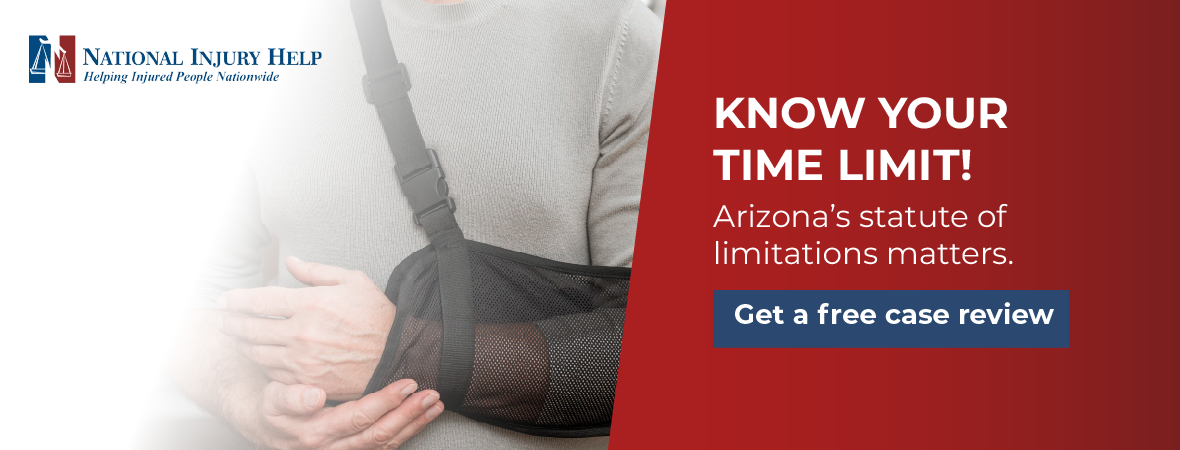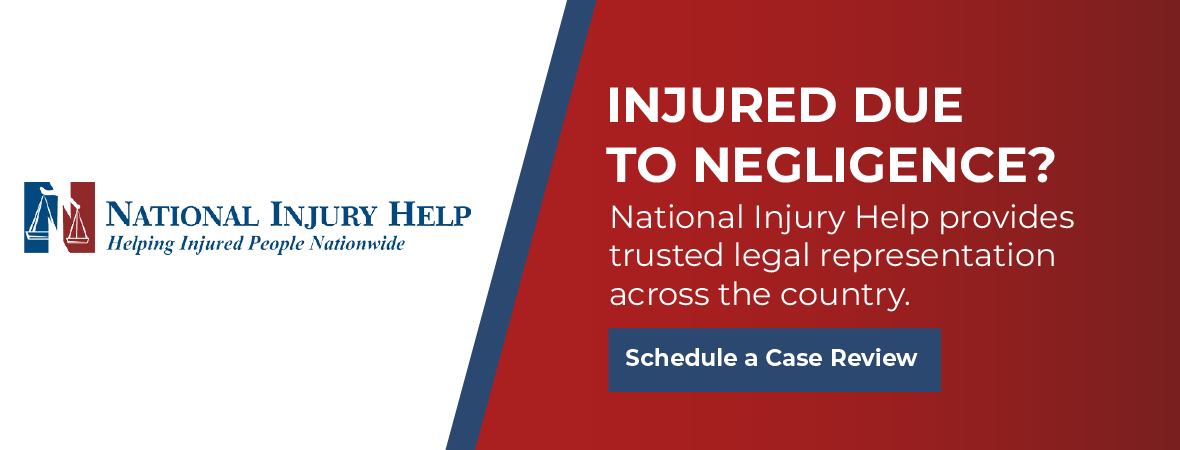Don’t let confusion about time limits cost you the compensation you deserve. Take action now to ensure your rights are protected and your voice is heard.
If you’ve been injured in a car crash on I-17, a slip and fall at Desert Ridge Marketplace, or a bicycle accident along Roosevelt Row, your focus should rightly be on healing. But there’s another critical factor you can’t afford to ignore: time. In Arizona, strict legal deadlines determine how long you have to take legal action after an accident. Waiting too long could mean losing your right to compensation altogether.
Whether you’re just starting to explore your legal options or are unsure whether it’s too late to file, this page explains everything you need to know about the Arizona personal injury deadline, including how it applies to your case, special exceptions, and why working with an experienced Arizona personal injury lawyer can help you avoid costly mistakes.
What Is the Arizona Personal Injury Deadline?
Arizona law generally gives injury victims two years from the date of the injury to file a personal injury lawsuit. This time limit, officially known as the statute of limitations, is one of the most important rules in the personal injury process. If you miss this deadline, the court is likely to dismiss your case, regardless of how serious your injuries are or how obvious the other party’s fault may be.
This injury lawsuit time limit is governed by Arizona Revised Statutes § 12-542, and it applies to a wide range of personal injury cases, including:
- Car and truck accidents on freeways like I-10 or State Route 51
- Pedestrian or bicycle accidents in neighborhoods like Downtown or Encanto
- Dog bites and animal attacks in city parks or residential areas
- Slip and falls at businesses like Arizona Mills or CityScape Phoenix
- Workplace accidents and construction site injuries
- Product liability and defective drug claims
If your accident occurred anywhere in Phoenix, near Grand Avenue, Sky Harbor Airport, or even in the suburbs like Ahwatukee or North Phoenix, this general two-year window likely applies.
Why This Deadline Matters More Than You Think
The statute of limitations doesn’t just affect lawsuits; it can also impact insurance claims. Insurance companies know the law, and they may delay negotiations until the two-year window is nearly closed. If you don’t have a lawsuit filed by then, your bargaining power may vanish.
Missing the Arizona personal injury deadline can result in:
- Losing your right to file a lawsuit entirely
- Dismissal of your case by the court
- Insurance companies are refusing to negotiate
- Inability to recover damages for medical bills, lost wages, or pain and suffering
Are There Exceptions to Arizona’s Personal Injury Time Limit?
Yes, in certain situations, the standard two-year deadline may be shortened or extended. These exceptions can dramatically impact your rights and the steps you need to take.
Claims Against Government Entities
If your injury was caused by a government employee or occurred on public property, such as falling at a city-owned facility or being hit by a Valley Metro bus, you must follow a much shorter timeline.
Under Arizona law, you must:
- File a Notice of Claim within 180 days of the injury
- File the actual lawsuit within one year
These rules are strictly enforced. Missing the notice deadline typically results in automatic dismissal. If your injury happened near Phoenix City Hall, a municipal park, or involved a state employee, this shorter timeline likely applies.
Minors and Legal Incapacity
If the injured person is a minor, the statute of limitations is paused, or “tolled,” until they turn 18. From that point, the two-year countdown begins. This also applies in cases involving individuals with mental incapacity who are unable to manage their own legal affairs.
How to Know Which Deadline Applies to You
Because personal injury cases can involve overlapping jurisdictions and unique facts, determining the correct legal deadlines in Phoenix isn’t always simple. For example:
- A car crash involving a government-owned vehicle may fall under both the general and government-specific timelines.
- An injury caused by a defective product may involve both state law and federal regulations.
- A pedestrian accident involving multiple drivers could lead to different deadlines for different defendants.
Consulting an Arizona personal injury lawyer as soon as possible is the best way to ensure you’re on track to meet all relevant legal deadlines.
Where Legal Deadlines Most Often Catch Victims Off Guard
One of the most common reasons injury victims in Phoenix lose their right to compensation is simply not knowing the clock has already started ticking. Many people assume they can wait until they’ve recovered, finished medical treatment, or feel “ready” to file a claim. Unfortunately, the law doesn’t offer that kind of flexibility.
This is especially true after seemingly minor accidents that later turn into serious health issues, such as a back injury from a fender bender near Central Avenue and McDowell Road that worsens over time. By the time some victims realize the full extent of their injuries, they’re dangerously close to missing Arizona’s legal deadlines.
Others mistakenly believe that ongoing negotiations with an insurance adjuster preserve their right to sue. They don’t. Unless a lawsuit is filed before the applicable statute of limitations expires, you could lose your legal recourse, no matter how valid your claim is.
The Clock Starts Ticking the Day You’re Injured
In most cases, the statute of limitations begins on the date of the accident or injury. This is important to understand; there’s rarely a grace period once you realize the extent of your injuries. If you were involved in a collision near the intersection of Thomas Road and 7th Avenue, for example, your two-year window likely began that same day.
There are some exceptions. For instance, if an injury wasn’t immediately apparent, such as internal damage from a defective drug, the clock may not start until the injury is reasonably discovered. This is called the “discovery rule.”
Still, discovery-based extensions can be hard to prove and may face challenges from the defendant or insurance companies. Acting quickly gives your case the best possible chance of success.
How a Personal Injury Lawyer Helps You Meet the Deadline
One of the most valuable roles your attorney plays is keeping your case on schedule. From day one, your lawyer will track your deadlines, file paperwork on time, and take steps to preserve your legal rights. Personal injury cases are time-sensitive, and once evidence starts disappearing or memories fade, it becomes harder to build a strong claim.
An experienced injury lawyer will:
- Calculate all applicable deadlines based on your case’s details
- Send necessary notices and demand letters on time
- Prepare and file your lawsuit before the statute of limitations expires
- Monitor court dates, settlement offers, and ongoing requirements
When your case involves large medical expenses, lost income, and long-term suffering, you need someone who understands not just how the law works, but how to work within the law’s timeline.
Don’t Wait to Start Your Case
Time is not on your side after a serious injury. Even if you’re still undergoing treatment or unsure of your next steps, it’s a smart move to consult a personal injury lawyer early. The sooner you begin, the more time your legal team has to investigate, negotiate, and, if necessary, file your lawsuit within the proper window.
Waiting until the final weeks or months can lead to rushed decisions, missed evidence, or avoidable mistakes. And once the deadline passes, no amount of evidence or proof will bring your claim back to life.
Special Considerations for Fatal Accidents (Wrongful Death Claims)
If you’re pursuing compensation after the death of a loved one, you may be eligible to file a wrongful death claim. In Arizona, the statute of limitations for wrongful death is also generally two years, but the clock starts on the date of death, not the date of injury.
This distinction matters, especially if the deceased person survived for days, weeks, or months after the accident. For example, if your loved one was seriously injured in a motorcycle crash near Camelback Road and later passed away at Banner Health, the two-year deadline would start on the date of their passing.
How Long Do Injury Cases Take Once Filed?
Meeting the deadline to file is critical, but it’s just the beginning of the litigation process. Once a personal injury lawsuit is filed, the case can still take months or even years to resolve, depending on its complexity, the number of defendants, and whether it goes to trial.
While there’s no time limit for how long a case can last once it’s been properly filed, the sooner you start, the sooner you can begin pursuing the justice and compensation you deserve.
Protect Your Rights Before It’s Too Late
Navigating the Arizona personal injury deadline requires more than just knowing the law; you need a partner who will advocate for you, stay ahead of time limits, and fight for maximum compensation.
With more than $100 million recovered for clients in a wide range of personal injury cases, this legal team has the experience and dedication to handle even the most complex claims, whether your case involves a local car accident, a slip-and-fall in Phoenix, or a nationwide mass tort.
Don’t lose your chance to recover what you’re owed. Contact National Injury Help today at 1 (800) 214-1010 to speak with an experienced Arizona personal injury lawyer. Your consultation is free, and you won’t pay unless we win your case. Start your claim today and protect your rights before the clock runs out.
Frequently Asked Questions: Personal Injury Statute of Limitations in Phoenix
What is the statute of limitations for a personal injury case in Phoenix, Arizona?
In Arizona, the general rule is that you have two years from the date of your injury to file a personal injury lawsuit. This deadline is set by Arizona law and applies to most accident types, including car crashes, slip and falls, and dog bites.
When does the two-year clock start ticking?
The clock typically starts on the date the accident or injury occurred. For example, if you were in a car accident on the I-10, the two-year countdown begins that day. There is a rare exception called the “discovery rule” if an injury was not immediately apparent, but you should not rely on this.
What happens if I miss the two-year deadline?
If you miss the statute of limitations, the court will almost certainly dismiss your case. This means you lose your right to sue for compensation, regardless of how severe your injuries are or how clear the other party’s fault may be. Insurance companies will also likely refuse to negotiate.
Are there any exceptions to the two-year rule?
Yes, there are important exceptions. The most common are:
-
Claims against government entities (like a city bus or a fall in a city park): You must file a Notice of Claim within 180 days and a lawsuit within one year.
-
Minors: The two-year clock is paused until the injured child turns 18.
-
Wrongful Death: The two-year deadline starts on the date of the deceased person’s death, not the date of the initial injury.
Does the deadline apply if I’m still negotiating with an insurance company?
Yes. Ongoing negotiations do NOT pause or extend the statute of limitations. If the two-year deadline passes without a lawsuit being filed, you lose your ability to sue, which severely weakens your negotiating position.
How long do I have to file a claim if my accident involved a city vehicle or happened on public property?
You have a much shorter timeline. You must file a formal Notice of Claim with the government agency within 180 days of the accident. Failure to meet this 180-day deadline will result in your claim being barred.
I was in a minor accident, but my injury got worse over time. When does the clock start?
The law generally states the clock starts on the accident date. Even if your injury seems minor at first but worsens later, the two-year period likely began on the day of the initial incident. You should not wait until you feel fully recovered to explore your legal options.
How can a personal injury lawyer help me with these deadlines?
A lawyer will immediately identify all applicable deadlines for your specific case, ensure all necessary notices and paperwork are filed correctly and on time, and build your case within the legal time frame to protect your right to compensation.
What is the statute of limitations for a wrongful death claim in Arizona?
For wrongful death claims, the statute of limitations is also two years, but it begins on the date of the person’s death, which may be different from the date of the injury.
Where can I get help to make sure I don’t miss my deadline?
You can contact an experienced Phoenix personal injury attorney for a free consultation. They can review the details of your accident and advise you on the exact deadlines that apply to your situation.








